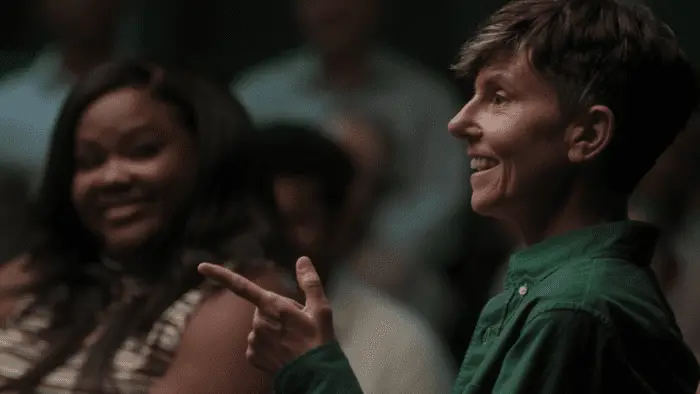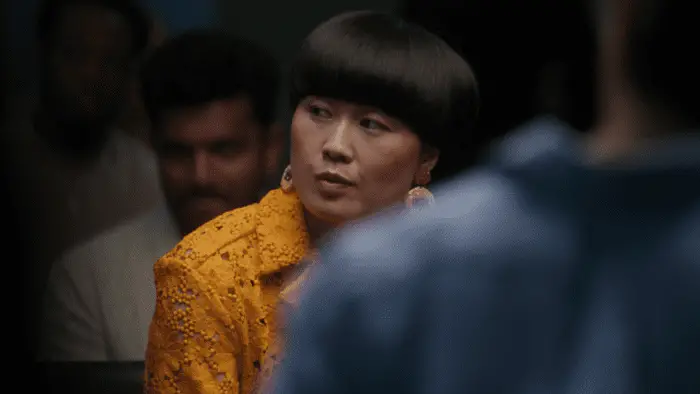Content warning: Given the subject material of this film, this review will also be dealing with subjects of drug abuse, mental illness, death, grief, and suicide. Reader discretion is advised.
To loosely paraphrase the late Robin Williams; how awfully ironic it is that entertainers whose entire careers are built on laughter so frequently experience mental anguish. The first few seconds of documentarian Neil Berkeley’s Group Therapy features a running montage of several comedians speaking on episodes of anxiety, low self-esteem, statistics about suicide, drug abuse, and so on. To drive home the point of how everlasting this issue is, the first clip shown is that of George Carlin, reciting the statistic that one person in America dies by suicide every 30 seconds. Then, among the last clips shown is of John Mulaney recounting his attempts to obtain prescription drugs through a second-rate doctor in Baby J. Once more, as if to hammer in the point further, Neil Patrick Harris enters to moderate a public group-therapy-esque conversation with a host of notable comedians—Tig Notaro, Mike Birbiglia, London Hughes, Atsuko Okatsuka, Nicole Byer, and Gary Gulman—with the implicit expectation that each and every one of them has a respective story to tell about their most dire internal struggles.
The intersection between art and therapy is naturally a strange thing; especially true for a medium as personal as stand-up comedy, where its entire construction is predicated on a single person on stage relaying stories of embarrassment, personal absurdity, and insurmountable irony to the amusement of, at best, thousands of people in dozens of audiences and venues. To comedians on a stage like this, vulnerability is both raw yet masked under laughter, a balance that proves difficult to reconcile when that vulnerability is grounded in struggles that require genuine treatment and support, and not just the double-edged sword of an audience’s validation.

Which then makes it that much more interesting and perhaps even necessary that the comedians in Group Therapy, who have the platforms and audiences that they have, are leaning into and exposing how raw their struggles truly are when faced completely head-on and with the needed gravitas, even as their impulse to filter it through a comedic instinct lingers and offers much-needed levity. The film moves back and forth between multiple spaces and formats, which, for a moment, is somewhat of a relief for a documentary scene frequently dominated by talking-head interviews; first with the group therapy session, then with a series of intimate conversations between a handful of those comedians, and then with individual interviews.
It’s just a shame, then, that the nature of those conversations, and the nature of the information revealed through each type of conversation, doesn’t exactly change across those different formats. It feels like a major missed opportunity or a flaw within the format itself; the documentary has an impact only to the extent that one is listening into important displays of true vulnerability from comedians who now know better than when they started. That aside, though, everything we hear from them is consistent throughout; the things we learn from each comedian in one type of conversation is largely the same as the things we learn in another, and the three different formats start to blur into each other with that realization.
That said, the things that each of these comedians do reveal about themselves, the perceptions of the industry they work in, as well as their perceptions of their peers, provide piercing insights into both how universal mental illness can be in an industry littered with cutthroat competition, the sanctifying of flawed human celebrities, and various racial aggressions and prejudices. Few of the comedians in this film fit the traditional mold of what is presented as the norm in LA—Notaro and Harris are queer, and Hughes, Okatsuka, and Byer are comedians of color—and even if they do, the troubles they know they possess are enough to have isolated them from the emotional ideal of tough skin touted by more ruthless decision-makers in the industry.

Said troubles are myriad in nature; Notaro, for one, recounts the viral news of her revealing her breast cancer diagnosis through a set in the Largo Theatre. Harris has a long history of observing the endless ladder of upward achievement in LA and its self-destructive effects. Gulman treads back on a deeply painful 2017, in which he was admitted to a psychiatric ward for his chronic depression. Birbiglia’s comedy has sometimes dealt with a strong sleepwalking disorder that led to various risky incidences. Byer and Hughes have individual stories of how their Blackness and their body images were set against the platonic white-blonde ideal of femininity, and subsequently stereotyped for being inherently unable to align with it. Okatsuka navigates a complex relationship with existing in an immigrant family, as well as her mother’s schizophrenia diagnosis. There is a tapestry of complex emotions and grief littered throughout these interviews and conversations, but the undercurrent of hope that exists here is that every single one of these comedians still remains in this space; that they survived to tell their respective tales, and that they are living happier lives even with continuous struggles.
There’s a level of inspiration that these comedians derive from exposing their greatest vulnerabilities to an audience. Their ability to mine the absurdity from something that would typically be dead series is what draws a greater audience to comedy, who see their own vulnerabilities and demons being reformatted in a way that makes those struggles accessible, something to hold power over through laughter. But there’s also a counterbalance to that particular dynamic—continually exposing one’s own secrets to the world as a subject of comedy, and attempting to elevate oneself to an unattainable ideal to an industry and an audience that keeps asking for more. These comedians have unique stories, but the ubiquitous truth tying them all together is that staying both funny and relevant in the face of modern comedy often comes at the expense of their mental integrity, which requires serious support and intervention. The truth that extends beyond that is their desire to impart to their audiences that there will always be more to their struggles than their comedy sets imply. There is always a separation between the stage and real life, even as the two arenas seem to be constructed as being one and the same.




